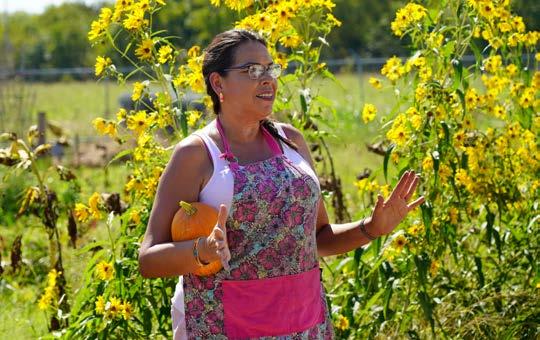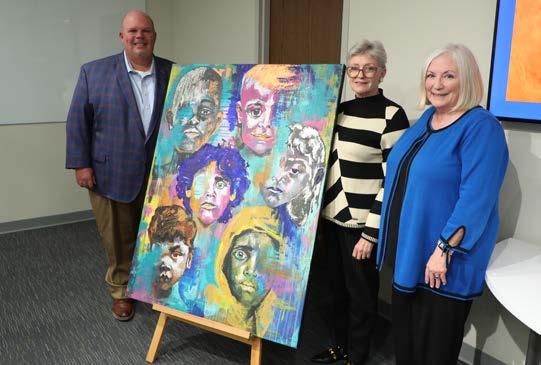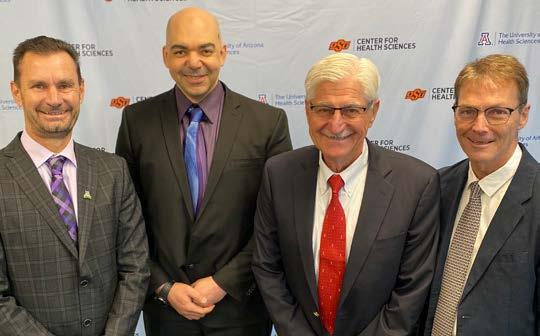
3 minute read
ADVANCING RESEARCH
Center For Indigenous Health Research And Policy
Center for Indigenous Health Research and Policy (CIHRP) brings together scientific collaborators and Indigenous and community leaders to eliminate health disparities and cultivate health and wellness in Native American communities.
In the summer of 2023, CIHRP received a $3.5 million donation from Novo Nordisk Inc., to fund the Indigenous Foodways and Health Initiative, which will support Indigenous food systems and practices that strengthen language revitalization and access to traditional foods.
With this donation, CIHRP’s role will be to support the partnering communities in identifying and implementing measures to evaluate the impact of their programs on Native health.
CIHRP is also heading several community-based participatory research studies. The Indigenous Supported Agriculture study, co- led with the Osage Nation, is in the third year of a five-year study funded by the National Institute on Minority Health and Health Disparities. The program provides weekly boxes of fresh vegetables, fruits, herbs and shelf-stable healthy foods to Native families living in the Osage Nation. The goal of this food sovereignty initiative aims to increase food security, reduce blood pressure, prevent and manage diabetes, and improve healthy eating.
OSU-CHS Centers of Excellence build on the mission to improve the health of rural and underserved communities by addressing health challenges and promoting collaborative research.
Another CIHRP initiative is the Center for Indigenous Innovation and Health Equity funded by the Office of Minority Health. The initiative supports revitalization of traditional foods in American Indian and Alaska Native communities including the Choctaw Nation’s Growing Hope program that distributes heirloom seeds to Choctaw Nation families to support the restoration of traditional gardens and improve healthy eating patterns.
Center For Integrative Research On Childhood Adversity

In September 2022, the Center for Integrative Research on Childhood Adversity (CIRCA) was awarded $9.5 million from the National Institutes of Health for phase 2 of its program that supports research of Adverse Childhood Experiences, or ACEs.
ACEs are a leading public health problem and include child abuse and neglect as well as parental mental illness, domestic violence, incarceration, drug or alcohol abuse and divorce. These affect more than 60 percent of Americans, and Oklahoma has one of the highest rates of ACEs in the U.S.
In order to reduce the harmful effects of ACEs, research is needed that better explains how childhood adversity affects developing neurobiological systems and how protective experiences can buffer those effects.
During phase 2, researchers will study the effects of ACEs on multiple biological and behavioral systems and identify more effective ways to prevent and treat the effects of ACEs.
CIRCA’s Mindful First Responders program was also renewed for a third year from the Oklahoma State Department of Health. The program was created to address the rise in Oklahoma first responder stress and fatigue across the state and builds on proven meditation and mindful movement strategies to help this group repair and build resilience for stressful conditions.
Center For Health System Innovation
The mission of Center for Health System Innovation (CHSI) is to transform rural and Native American health through the implementation of innovative care delivery and information technology solutions. It is one of the largest health innovation groups in the country and the largest focused on rural and tribal health and predictive health analytics.
The CHSI team has generated more than 150 research publications, abstracts and presentations and filed for two patents. The center has also received grants from the National Institutes of Health, National Science Foundation, Centers for Disease Control, and Oklahoma Center for the Advancement of Science and Technology, and received sponsored research agreements with Google, Verily, Wolters Kluwer and Pfizer totaling more than $10 million.
CHSI has developed networks to help guide innovation efforts:
• Rural Oklahoma Network, a federally registered practice-based research network consisting of 75 primary care physicians across a network of 39 primary care clinics.
• The Oklahoma Business Collective on Health is a network of more than 30 self-insured employers, who are also health care purchasers, representing more than 60,000 employees encompassing rural and urban Oklahomans.
• Rural Health Network of Oklahoma provides health IT services and support to rural health care providers operating in 70 counties and eight rural or tribal hospitals.
NATIONAL CENTER FOR WELLNESS & RECOVERY
The ongoing research partnership between OSU’s National Center for Wellness & Recovery (NCWR) and The University of Arizona continues to progress with joint research projects and grant applications to advance multiple potential life saving projects. These initiatives span the exploration of new Medication Assisted Treatments (MAT) for Opioid Use Disorders (OUD) and pursuing non-addictive pain relief solutions free from undesirable side effects such as respiratory issues and gastrointestinal problems.
NCWR continues to work on building out the bench chemistry lab space in the Helmerich Research Center on the OSU-Tulsa campus while simultaneously hiring new chemists to further fuel the NCWR mission.
In early 2024, a new NCWR website launch aims to be a one-stop shop of information about the center’s bench to bedside solutions and new discoveries for treating chronic pain.
NCWR is investing in addiction treatment, research, education and technology in conjunction with well-thought-out collaborations. These strategic steps are designed to have an enduring significance, furthering efforts to make a difference in pain management and scientific advances that could ultimately help save lives.
$170 million in grant proposals the grants received in fiscal year 2022 2x OSU-CHS RESEARCH GROWTH
$111 million in grants received







